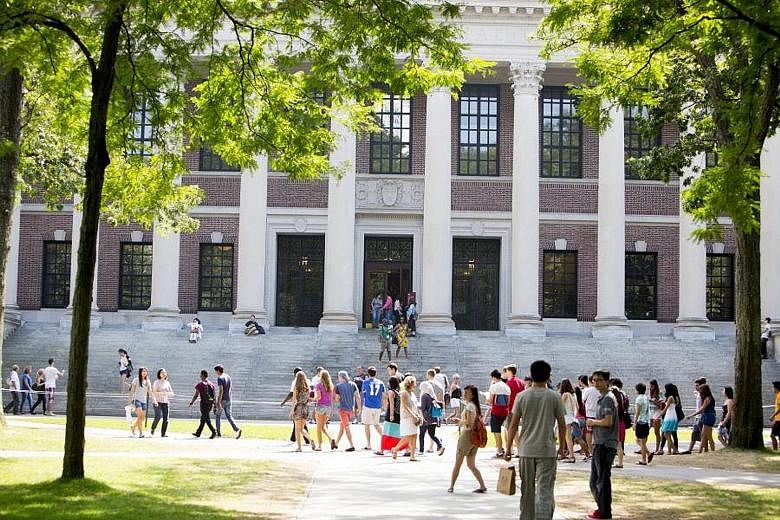NEW YORK • By most standards, Mr Austin Jia holds an enviable position. A sophomore at Duke, he attends one of the top universities in the United States, setting him up for success.
But with his high GPA (grade- point average), nearly perfect score on the SAT aptitude test, and student activities - debate team, tennis captain and state orchestra - Mr Jia believes he should have had a fair shot at Harvard, Princeton, Columbia and the University of Pennsylvania. Those Ivy League colleges rejected him when he applied in 2015.
It was particularly disturbing, Mr Jia said, when classmates with lower scores than his - but who were not Asian-American, like him - were admitted to those Ivy League institutions.
"My gut reaction was that I was super disillusioned by how the whole system was set up," Mr Jia, 19, said.
There is now a lawsuit accusing Harvard of discriminating against Asian-Americans in admissions by imposing a penalty for their high achievement and giving preferences to other racial minorities.
The case, which is clearly aimed for the Supreme Court, puts Asian- Americans front and centre in the latest stage of the affirmative action debate. The issue is whether there has been discrimination against Asian-Americans in the name of creating a diverse student body.
The Justice Department, which has signalled that it is looking to investigate "intentional race-based discrimination in college and university admissions", may well focus on Harvard.
The Harvard case asserts that the university's admissions process amounts to an illegal quota system, in which roughly the same percentage of African-Americans, Hispanics, whites and Asian-Americans have been admitted year after year, despite fluctuations in application rates and qualifications.
"It falls afoul of our most basic civil rights principles, and those principles are that your race and your ethnicity should not be something to be used to harm you in life nor help you in life," said Mr Edward Blum, president of Students for Fair Admissions, the organisation that is suing Harvard.
Ms Melodie Jackson, a Harvard spokesman, said the university's admissions policy was fair; that it looked at each applicant "as a whole person", consistent with standards established by the Supreme Court; and that it promoted "the ability to work with people from different backgrounds, life experiences and perspectives".
Harvard's Class of 2021 is 14.6 per cent African-American, 22.2 per cent Asian-American, 11.6 per cent Hispanic, and 2.5 per cent Native American or Pacific Islander, according to the university's website.
A Princeton study found students who identify as Asian need to score 140 points higher on the SAT than whites to have the same chance of admission to private colleges, a difference some have called "the Asian tax". Data in the lawsuit, experts say, suggests that if Harvard were forbidden to use race as a factor in admissions, the Asian-American admissions rate would rise, and the percentage of white, black and Hispanic students would fall.
But some Asian-American students believe Harvard's system has enriched their educational experience. Ms Emily Choi was not aware of concerns about discrimination against Asian-Americans until she arrived on campus and heard about the lawsuit.
"I firmly believe in affirmative action," she said. "The diversity at Harvard has been key to my learning, and I think if there weren't so many people of different backgrounds, I wouldn't be forced to think about things in new ways."
NYTIMES

